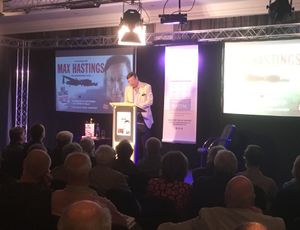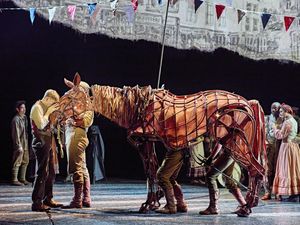Dam Busters myths debunked in evening with Max Hastings in Shropshire
"A lot of what we think we know is wrong."

That was Max Hastings' take on the famous story of the Dam Busters, a subject he knows better than most, when he spoke in Shropshire last night.
Challenging the myths around one of Britain's most famous military operations ever was the theme of Mr Hastings' talk.
The respected military historian and former BBC foreign correspondent spoke at the Lion Quays Hotel near Oswestry on his new book Chastise: The Dambusters Saga 1943.
More than 100 fans turned out on Wednesday evening to hear him describe in captivating detail the build-up to Operation Chastise, the Royal Air Force's attack on three German dams in the Ruhr valley, which succeeded in bursting two and releasing a devastating 330 million tons of water, destroying houses, factories and mines.
He warned against modern mythologising of the operation which revived the British people's "confidence in their nation's genius", but nevertheless paid tribute to the "imagination, technical wizardry and courage" that made it possible.
The evening opened with a clip from the famous 1955 film The Dam Busters, re-enacting the dramatic moment the British, Australian, Canadian and New Zealander pilots of 617 Squadron realised they had achieved something once thought impossible, and with the highest of stakes.
'Tragic figure'
Much of his talk revolved around three of the key British players in the pioneering operation; the inventor of the new bouncing bomb, Barnes Wallis, the young wing-commander who led the raid, Guy Gibson, and the ruthless Sir Arthur 'Bomber' Harris.
He told the story of Gibson, the "lonely, indeed tragic" figure who "carried the demons" of his troubled upbringing and led a mission into the unknown.
He spoke of Bomber Harris, a "monster" who always maintained that the bombing of German cities was justified, albeit a monster who was useful in a "war of national survival".
Harris was sceptical of Wallis' designs for the bombs and regarded the raids as a waste of resources.
Wallis' bombs needed a precision "more than most flesh and blood" could contrive, and yet the pilots succeeded in their mission.
Mr Hastings recalled that the young airmen of 617 Squadron were cruelly told before carrying out the raid that success could mean winning the war, when in reality the most it could have achieved was make "an almighty mess".
He also made sure to tell the story of the terrified civilians who died in their hundreds in the floods and chaos following Operation Chastise, becoming "human flotsam" washed through the Ruhr region by the destructive force of the water that was unleashed.
1,000 Polish, Russian and Ukrainian people who were forced to work by the Nazis lost their lives in the aftermath of the two dams' breaches.
'Victims of all peoples'
Answering questions at the end of his talk, Mr Hastings also had words of reproach for those who look back on the World Wars with misplaced nostalgia and misunderstand its lessons.
He decried the "very stupid people" today who reminisce about "standing on the white cliffs of Dover and giving two fingers to those foreigners over there".
"I do think that one has to recognise the plight of victims of all peoples, of all nationalities, in war. The older I get the more moved I get by that.
"The people I've no time for are those who pretend it was all a great lark and it was all such fun."
Mr Hastings was presented with a goody bag with 'Greetings from Oswestry' at the end of the evening.
His evening at Lion Quays followed an appearance by another very tall, bespectacled journalist who drew a crowd at the same venue – broadcaster Louis Theroux spoke on his new book Gotta Get Theroux This the day before.
It was also organised by Booka, an Oswestry bookshop. The staff work hard to organise literary events and appearances by writers throughout the year.
Former MP and author Gyles Brandreth will be appearing at the hotel on September 26. For more details see bookabookshop.co.uk/events
Chastise: The Dambusters Saga 1943 is available now.





